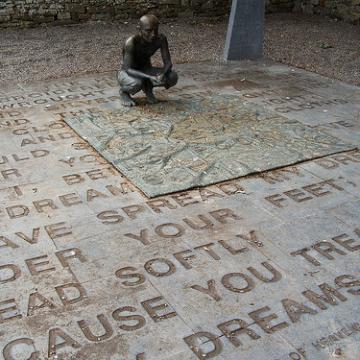One of the lovely things about living in a college town is that you might get an invitation like this:
“We’d like to invite you to a poetry reception next Sunday, Jan. 9. Everyone is asked to bring one or two short poems to read and we’ll enjoy each other’s selections, conversation, and company along with some snacks and beverages.”
Ah, but what to bring? I have a lot of poetry on my bookshelves, most bought decades ago when I was studying poetry in college and fantasizing about reading my own masterpieces in auditoriums full of hushed admirers.
My image of what it meant to be a poet required me to be very pure in those days: I avoided fast-food restaurants, popular entertainments, blighted landscapes. Anything I couldn’t imagine William Wordsworth doing, I wouldn’t do.
What could I imagine Wordsworth doing? Why, dancing with the daffodils, of course. So I tried to dance with the daffodils as often as possible, which, when you think about it, is not a bad design for living.
Alas, sometime around my 30th birthday the daffodils had to find a new dancing partner. I had become a newspaperman and once again tried to conform to some cockamamie image, this time, of the hard-boiled, just-the-facts, no-nonsense type. (I later ran across a Roz Chast carton in the New Yorker that depicted “nonsense types” and concluded that it was better to be a nonsense type than a no-nonsense type.)
In the journalism world, writing is supposed to be so clear, birds will bounce off it, not knowing it’s a window. All writers should strive for such clarity, I decided. To T. S. Eliot’s (or J. Alfred Prufrock’s) declaration that “it is impossible to say just what I mean!” my response became, “Try harder, Tom (or Alfie)!” (though Prufrock’s “Love Song” remains one of my all-time faves and every time I go to the beach in long pants the words “I shall wear the bottoms of my trousers rolled” pop into my head).
I began to suspect that many poets weren’t trying at all: The more opaque you were, the greater the chances someone might mistake your opacity for profundity. I know I tried to write obscure poems myself back when I was young and easy under the apple boughs. And I applied myself to the task of “teasing out” or “glossing” the meaning of difficult poems with the same puzzle solver’s glee I bring to the New York Times crossword now.
Doubtless some poems were genuinely profound, but I lost confidence in my ability to distinguish the profound from the pretentious. I became the philistine in the art museum who demands to know the difference between Jackson Pollock’s dribbles and a child’s scribbles. When I ran across a poem in the New Yorker or the Atlantic, if I didn’t grasp it straightaway I’d silently apologize to the poet: “I’d love to spend the next 20 minutes working my way through your chain of private associations, but I’m afraid I simply have too many other things to do.”
Now here’s what’s cool about sticking around for half a century and longer: You just might metamorphose another time or two. In the last few years I’ve rediscovered poetry and returned to dancing with the daffodils.
Maybe it’s because I was wounded by someone close to me and the wound let in all this light and air and music that had been blocked out before. Maybe it’s because I fell in love and began writing sappy love poems. And maybe it’s because in middle age I recognize the difference between wisdom and wising up.
Now I see that we write poems – and read them – because it is impossible to say just what we mean. Indeed, the supposed clarity of news writing doesn’t really explain anything. Consider, for example, the media blather about a madman’s shooting spree in Tucson last weekend. If you’re trying to make sense of it or derive a lesson from it, you’re better off with these famous lines from Yeats’s “The Second Coming”:
The best lack all conviction, while the worst
Are full of passionate intensity.
Or these from W.H. Auden’s “September 1, 1939”:
Waves of anger and fear
Circulate over the bright
And darkened lands of the earth,
Obsessing our private lives;
The unmentionable odour of death
Offends the September night.
And:
Those to whom evil is done
Do evil in return.
And finally:
We must love one another or die
In the end, though, I neither brought Yeats nor Auden to the poetry party. I brought a poem by Philip Levine called “They Feed They Lion.” No, I don’t know what the title means, nor can I offer any clear explanation of the poem. But I come away from it feeling wakened to the beauty in blighted landscapes. There’s comfort in that. There was comfort in all the poems read that night.



